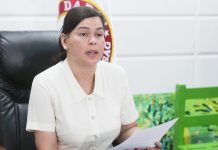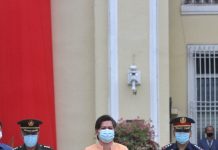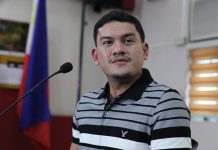A ranking Department of Health official criticized a controversial study made on the health of residents living near a banana plantation in a sitio in Hagonoy, Davao del Sur, and made as basis of a recommendation to ban aerial spraying of fungicide to control the deadly black sigatoka disease.
DOH Assistant Sec. Paulyn Jean Russel- Ubial said a study on one small community alone was not enough ground to make a conclusion that aerial spraying should be banned. She said the research was made only in sitio Camocaan which was near a banana plantation practising aerial spraying.
“There should be a study on another community not near a banana plantation using aerial spraying in order to have a basis for comparison and before any conclusion or recommendation is made,” Ubial told newsmen attending a press briefing over the weekend on the Philippine National Health Research Systems (PNHRS) in Davao City last week.
The PNHRS encourages and funds local government units’ proposals to conduct studies on identified local health problems as basis for policies and ordinances.
Asec Ubial also said that the controversial Camocaan health study was not conducted by the DOH but by a research team of the University of the Philippines-National Poison Management and Control Center and the Philippine Society of Clinical and Occupational Toxicology.
“We at DOH merely assisted in the conduct of the study by accompanying the researchers to the area,” said Ubial, who was regional director of the DOH in the Davao Region shortly before she was promoted to Asec.
She said a follow-up study on Camoocan is a must before any policy is formulated on the issue of aerial spraying.
The Camocaan study was made in 2006 to verify claims by a certain Dr. Romeo F. Quijano that people either have died or were dying because of exposure to aerial spraying. Dr. Quijano, an anti-pesticide activist, who is president of the Pesticide Action Network Asia Pacific (PANAP), had been campaigning against aerial spraying for years, even showing presentations in other countries, and making claims about deaths and widespread diseases due to the practice. Many of Quijano’s claims were later found to be fabrications and lies, the Pilipino Banana Growers and Exporters Association (PBGEA) charged.
The Camocaan study was roundly criticized by knowledgeable research and technical experts of PBGEA who listed several inadequacies and defects of the Camocaan study.
Due to the weaknesses of the Camocaan study, the PBGEA under president Stephen Antig requested DOH secretary Francisco Duque to order a peer review of the controverted findings.
PBGEA spokesman Anthony B. Sasin lamented that activists are asking the ban of aerial spraying solely based on fiction, not authentic unbiased scientific studies, none of which has ever been conducted on the subject.
In last Wednesday’s press briefing at Marco Polo Hotel, Asec Ubial explained that the Camocaan study should have compared whether or not aerial spraying is better or worse than manual spraying.
“What they compared was the use of pesticides against organic farming,” and because of this, the result was predictably in favor of organic farming.
The health official said that with the advent of the globally-funded PNHRS, health research and development studies are decentralized, with the LGU and their collaborators studying their local problems before coming out with recommended actions.
In the same media briefing, Dr. Juan Pablo Nañagas, chairman of the PNHRS structure, organization, monitoring and evaluation (SOME) committee, said that one of the primary objectives of the new health research system is to make sure that policies and laws are based on research, “hindi yong naisip lang o maganda sa boto, gagawa ka na ng policy (not simply based on random thought or a good vote-getting idea).”
It has to address clearly identified local problems, he said.
Asec Ubial said that local government units ought to have a health research and development agenda, because what they have now is only executive-legislative agenda.
There ought to be a paradigm shift, Ubial said, as she invited LGUs to now identify the local health issues for research and development studies as there is funding for such activities.
0 Comments
Oldest






